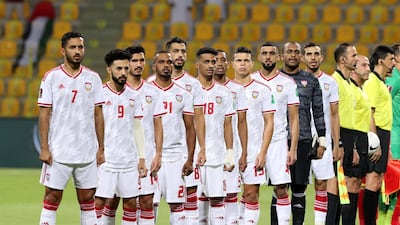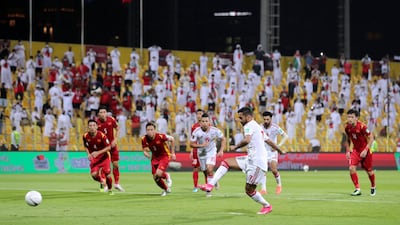The UAE’s bid to reach the 2022 World Cup continues following their progression to the third and final round of qualification. The national team won all four qualifiers since the campaign restart on June 3 to top Group G. Here’s some of the key points that saw them through.
Bert van Marwijk’s reappointment
Originally installed as manager in March 2019, the Dutchman’s first tenure lasted nine months – taking in the first four second-round qualifiers (two wins, two defeats). However, Van Marwijk returned almost a year to the day after his first spell ended – two other managers filled the interim - and quickly began implementing his plan for qualification.
Charged in 2019 with bringing through fresh blood, Van Marwijk has built on that while honing a progressive style of play, with the players clearly buying into it. The development in the past six months, through four training camps and with help from his experienced staff, has been obvious.
Van Marwijk has managed at a World Cup final, but more importantly given his current role, guided Saudi Arabia to the 2018 finals. In truth, he always felt the right man for the UAE job. The Football Association deserve credit, too, for the decision to reverse that initial call in December 2019.
Ali Mabkhout, master marksman
Another campaign concluded, another star display from the UAE’s all-time leading scorer. That record was achieved back in October 2019, before the pandemic and the postponed qualification, but Mabkhout has simply carried on where he left off.
In the first game of this month's hectic 13-day assignment, he struck twice in the 4-0 win against Malaysia, including the opener. An uncharacteristically off night came next, against Thailand, but Mabkhout vowed after the 3-1 win to bounce back swiftly. And so it proved, as he notched twice in the 5-0 victory against Indonesia.
Then, in the decider on Tuesday, he kept his cool from the penalty spot for the UAE to place one foot in Round 3. Mabkhout, now on 76 goals for his country – only Cristiano Ronaldo has more among the still-active in men's international football - finished as qualification's highest scorer, with 11 goals. Formerly part of a "Big Three" – Mabkhout, Ahmed Khalil, Omar Abdulrahman – he continues to step up in their absence.
Abdullah Ramadan’s burgeoning role
Debut on Matchday 4 of the second round, decisive and dazzling playmaker by the conclusion. Ramadan made his international bow aged 21 in the 1-0 defeat to Vietnam in November 2019, but in the four matches since has become integral to his national team.
Against Malaysia, he assisted twice, including a beautiful, long-range ball over the top for Mabkhout to set the UAE on their way. Ramadan was creator once more in Tuesday’s top-of-the-table clash, providing a sublime assist for Ali Salmeen to open the scoring, and then prompting the penalty for the hosts to double their lead.
Throughout, though, he was superb. Confident on the ball, incisive and inventive, Ramadan’s creation is matched by his work-rate. Little wonder Van Marwijk labelled him last week as one of the best players in the UAE. Pivotal in Al Jazira winning the 2020/21 Arabian Gulf League, and now for country, the midfielder is a joy to watch.
Naturalised trio enhance attack
For too long, the UAE relied on Mabkhout and Khalil for goals. With the latter’s continued unavailability through injury, however, that had largely fallen upon Mabkhout’s shoulders. Fortunately, the burden is now shared.
Fabio De Lima, Caio Canedo and Sebastian Tagliabue were granted UAE citizenship at the beginning of last year and they have contributed already in their adopted country’s World Cup bid. In De Lima’s case, his input has been hugely significant. The Brazil-born forward scored five times in four qualifiers this month, including doubles against Malaysia and Indonesia.
Also, his flourishing relationship with Bandar Al Ahbabi on the right is fundamental to how the UAE play. Canedo, meanwhile, began the middle two matches, going on to score a first competitive goal for the UAE with the opener against Thailand. The third of the trio, Tagliabue, featured the least, but still notched on competitive debut, rounding off the 5-0 thrashing of Indonesia. A landmark decision in Emirati football has reaped almost instant reward.
Tightening the defence
The UAE conceded three goals in four matches, although two came in the dying moments against Vietnam. Still, throughout the 13 days, Walid Abbas supplied a captain’s performance, with new centre-back partner Shaheen Abdulrahman improving as the qualifiers progressed.
It is telling that Van Marwijk went for experience at the heart of the backline – Abbas is now 36, Abdulrahman 28 – when previously he opted for Khalifa Al Hammadi (then 20) and Mohammed Al Attas (22). The tenacity of the full-backs, Mahmoud Khamis and Al Ahbabi, was substantial, too.
Also, the midfield played its part. A highlight against Vietnam was the balance provided by the trio of central midfielders: Van Marwijk’s decision to bring in Majed Hassan was inspired, while the all-action Salmeen continued to impress, complemented perfectly by Ramadan. All three offered excellent protection to the defence. It could provide the solution going forward, into the sterner tests that undoubtedly wait in Round 3.




















